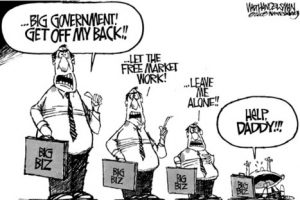
For many years politicians have been campaigning on the slogan of lower taxes and smaller government, which few of us can disagree with. You don’t hear many people running for office who say they will raise your taxes so bureaucrats can be in your face. So, to make it as divisive as possible, some politicians portray the government as a monster, growing out of control, and doing essentially nothing but preventing us from earning an honest living. While there may be some drops of truth in this, it is the sort of alarmist sentiment that preys upon the fears of the poorly informed. From Ronald Reagan’s “starve the beast” and “government is the problem” to the present day, politicians have outdone each other to show just how malevolent, inept and out of control the government is, particularly when it’s run by the opposing party.
Although bureaucracy and red tape can be wasteful and counterproductive, the portrayal of our federal government, and particularly its employees, as a “beast” or “monster” isn’t the least bit fair. Since the Reagan years, the number of federal employees has shrunk, if anything, particularly as a percentage of the American workforce. See http://www.businessinsider.com/how-big-is-our-government-2012-7, https://www.nationalreview.com/2017/02/federal-government-growth-continues-while-federal-employee-numbers-hold/ There isn’t much of a connection between government employment and rhetoric; the government workforce has been roughly steady, with its biggest decline during the Clinton years and a small increase during the George W Bush years due largely to the demands of fighting two new wars.
I have worked closely with government employees in quite a number of departments, as well as with organizations and committees that help oversee government agencies, over a period of decades. For the post part, government workers are committed to doing a good job and to serving us, the taxpayers. It has become increasingly so. While large and inefficient, it is not nearly as inefficient as it used to be, thanks to the same trends that have made the private sector more efficient — computers, automation, less management, and better management. Nearly every government manager that I have known works hard and could be earning more in the private sector. They choose to work for the government for various reasons, including stability of employment and benefits, a commitment to public service, and work-life balance. In some cases, they chose government careers because they found the government to be diverse where they had faced discrimination or other barriers in the private sector (for example, I know women lawyers in the government who felt that their path to partnership in firms was blocked by male lawyers).
It is notoriously hard to fire bad performers in the government, and this is a problem. But there aren’t that many bad performers, probably no more as a percentage than in any other organization. This makes it harder also to reward and incentivize the best performers. People say the government should be run more like a business, and this is true. It is being run more like a business, but maybe not quite enough. It doesn’t help that, regardless of the rhetoric, every time a new administration comes in (and sometimes in between) there are huge gaps in management, unfilled appointments, and confusion at the highest levels about what each agency is supposed to be doing. I would really like to hear a politician campaign on “I am going to bring people into the government in a timely manner, who are good leaders and effective managers, and empower them to run their agencies better”. And deliver on it. Mitt Romney was the closest I’ve heard, but he didn’t get a chance to prove it.
So the talk about smaller government is mostly just talk – the government workforce is getting smaller, anyway, and it’s getting better, and the people who make the loudest complaints do nothing more than anyone else to address any of the problems. It is just a red herring.
Now, the real “out of control” problem is the government spending. Even this isn’t as bad as it’s often portrayed, but an increasing share of the government budget goes to contracts to the private sector. This spending does some good things — it creates and sustains some good jobs, and it supports the development of new technologies, life saving medical treatments, and it can increase the competitiveness of some American businesses (military contracts are our way of subsidizing Boeing, while Canada subsidizes Bombardier and the European Union subsidized Airbus). But it has a dark side. I used to work for the General Electric Company, which did a lot of business with the U.S. government. GE would say it simply supported the policies of the government, but really GE would lobby for policies that favored GE, and even for procurements that would give it more money (such as fighter jets and submarines), or save it money (such as dumping and leaving PCBs in the Hudson River). All the while GE was outsourcing and cutting jobs.
So the problem isn’t rampant out of control government, but a system in which those with political power (whether companies, politicians, or individuals) reward themselves and their constituencies with a share of government spending. This can only be addressed with a more transparent, general and principled budgeting process.
